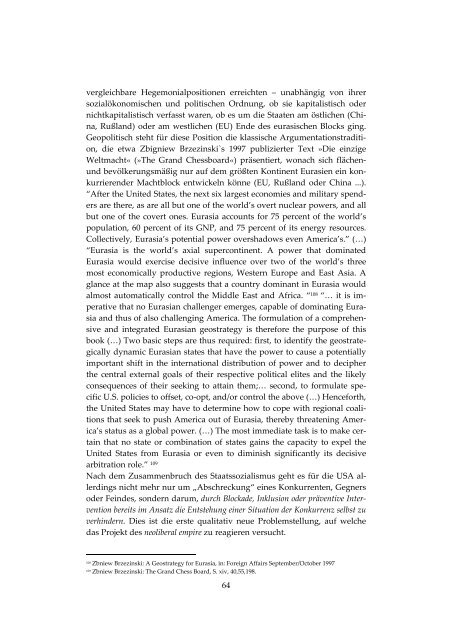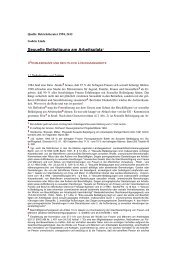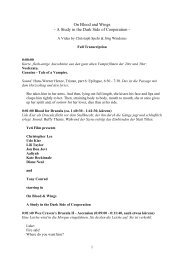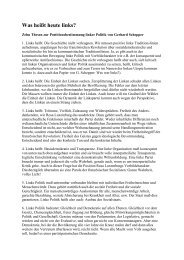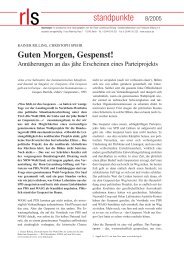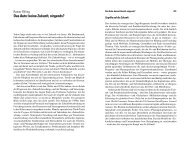outbreak. let's take over. american empire als wille ... - Rainer Rilling
outbreak. let's take over. american empire als wille ... - Rainer Rilling
outbreak. let's take over. american empire als wille ... - Rainer Rilling
Erfolgreiche ePaper selbst erstellen
Machen Sie aus Ihren PDF Publikationen ein blätterbares Flipbook mit unserer einzigartigen Google optimierten e-Paper Software.
vergleichbare Hegemonialpositionen erreichten – unabhängig von ihrer<br />
sozialökonomischen und politischen Ordnung, ob sie kapitalistisch oder<br />
nichtkapitalistisch verfasst waren, ob es um die Staaten am östlichen (China,<br />
Rußland) oder am westlichen (EU) Ende des eurasischen Blocks ging.<br />
Geopolitisch steht für diese Position die klassische Argumentationstradition,<br />
die etwa Zbigniew Brzezinski`s 1997 publizierter Text »Die einzige<br />
Weltmacht« (»The Grand Chessboard«) präsentiert, wonach sich flächenund<br />
bevölkerungsmäßig nur auf dem größten Kontinent Eurasien ein konkurrierender<br />
Machtblock entwickeln könne (EU, Rußland oder China ...).<br />
“After the United States, the next six largest economies and military spenders<br />
are there, as are all but one of the world’s <strong>over</strong>t nuclear powers, and all<br />
but one of the c<strong>over</strong>t ones. Eurasia accounts for 75 percent of the world’s<br />
population, 60 percent of its GNP, and 75 percent of its energy resources.<br />
Collectively, Eurasia’s potential power <strong>over</strong>shadows even America’s.” (…)<br />
“Eurasia is the world’s axial supercontinent. A power that dominated<br />
Eurasia would exercise decisive influence <strong>over</strong> two of the world’s three<br />
most economically productive regions, Western Europe and East Asia. A<br />
glance at the map <strong>als</strong>o suggests that a country dominant in Eurasia would<br />
almost automatically control the Middle East and Africa. “ 108 “… it is imperative<br />
that no Eurasian challenger emerges, capable of dominating Eurasia<br />
and thus of <strong>als</strong>o challenging America. The formulation of a comprehensive<br />
and integrated Eurasian geostrategy is therefore the purpose of this<br />
book (…) Two basic steps are thus required: first, to identify the geostrategically<br />
dynamic Eurasian states that have the power to cause a potentially<br />
important shift in the international distribution of power and to decipher<br />
the central external go<strong>als</strong> of their respective political elites and the likely<br />
consequences of their seeking to attain them;… second, to formulate specific<br />
U.S. policies to offset, co-opt, and/or control the above (…) Henceforth,<br />
the United States may have to determine how to cope with regional coalitions<br />
that seek to push America out of Eurasia, thereby threatening America’s<br />
status as a global power. (…) The most immediate task is to make certain<br />
that no state or combination of states gains the capacity to expel the<br />
United States from Eurasia or even to diminish significantly its decisive<br />
arbitration role.” 109<br />
Nach dem Zusammenbruch des Staatssozialismus geht es für die USA allerdings<br />
nicht mehr nur um „Abschreckung“ eines Konkurrenten, Gegners<br />
oder Feindes, sondern darum, durch Blockade, Inklusion oder präventive Intervention<br />
bereits im Ansatz die Entstehung einer Situation der Konkurrenz selbst zu<br />
verhindern. Dies ist die erste qualitativ neue Problemstellung, auf welche<br />
das Projekt des neoliberal <strong>empire</strong> zu reagieren versucht.<br />
108<br />
Zbniew Brzezinski: A Geostrategy for Eurasia, in: Foreign Affairs September/October 1997<br />
109<br />
Zbniew Brzezinski: The Grand Chess Board, S. xiv, 40,55,198.<br />
64


